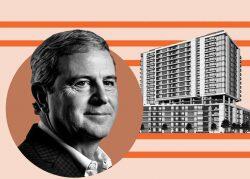Goldman Sachs’ plan to build a Dallas office tower and staff it with 5,000 employees will serve as a catalyst for further growth downtown, drawing businesses that want to work with the bank or serve its well-paid workers, according to the Dallas officials who approved a package of tax incentives for the project.
The Dallas City Council approved tax and other incentives worth about $18 million on June 22 for Goldman Sachs’ to build the tower at a cost of about $480 million. In the debate ahead of the vote, council member Paul Ridley argued that the city was attracting plenty of new business without offering incentives, while Goldman, which made a profit of more than $21 billion last year, hardly needs the money.
Other city officials argued Dallas would get its money’s worth as the Goldman move contributes directly and indirectly to the local economy.
“I’ve already spoken with another financial services firm interested in moving closer to where financial services are moving. So we will continue to see that sort of ripple effect,” said Robin Bentley, director of the office of economic development. “When CBRE moved their headquarters here about two years ago, we saw a number of other real estate firms looking at Dallas and moving headquarters here because they wanted to be close to that industry leader.”
Goldman, which has struggled to get its workers back in the office in New York, may have more success in Dallas, which has among the highest percentage of workers returning to offices in the country.
About 51 percent of Dallas workers had returned to the office as of last week, according to Kastle Systems, which tracks security card swipes in buildings around the country. That compares with 42 percent in New York, while Austin had 59 percent and Houston about 56 percent.
Goldman anticipates that the development will bring a minimum of 800,000 square feet of office space to the more than 11-acre site at 2323 N. Field St, making it the largest and most expensive office development in the city in years. The incentives provided by the council will include tax abatements and a job grant, with an average base salary of $90,000 for new workers.
Read more


Goldman already has almost 4,000 employees across North Texas, at sites including the Trammell Crow Center in downtown Dallas and Galatyn Commons in Richardson. The new office would be completed “no later than December 31, 2027,” according to the documents, and the city is asking Goldman Sachs to partner with Paul Quinn College, the University of Texas at Dallas and Dallas College to create workforce programs for internships and apprenticeships for the office as well.
“It’s 5,000 jobs total: 2,500 retained here in the city and then a new 2,500 added, wages obviously very high,” said Bentley. “We’re doing our typical participation of city hiring. So 35 percent, a minimum of 35 percent of those jobs will be filled by Dallas residents.”
The city voted to change the neighborhood zoning designations to allow property owners and developers to help bolster economic development in the city. Although the council previously did not comment on the financial benefits of the development, more information was provided during the June 22 meeting.
Even with the tax breaks for Goldman, which will last five years, the city will still receive about $2.4 million in tax revenue annually from the project, Bentley said. She compared it to an apartment building in North Dallas that generates about $662,000 in tax revenue.
“So even after our abatement, we’re still making double in tax revenue off of this one building than the entire North inside. And the tax abatement doesn’t apply to any of the future phases, so those will be coming in at full tax revenue to the city.”
